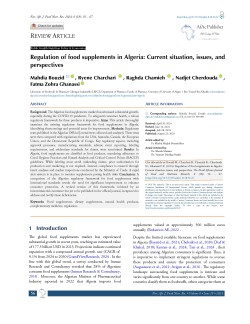Regulation of food supplements in Algeria: Current situation, issues, and perspectives.
Abstract
Background: The Algerian food supplements market has witnessed substantial growth, especially during the COVID-19 pandemic. To safeguard consumer health, a robust regulatory framework for these products is imperative.
Aims: This article thoroughly examines the existing regulatory framework for food supplements in Algeria, identifying shortcomings and potential areas for improvement.
Methods: Regulatory texts published in the Algerian Official Journal were collected and analyzed. These texts were then compared with regulations from the USA, Australia, Canada, the European Union, and the Democratic Republic of Congo. Key regulatory aspects, including approval processes, manufacturing standards, adverse event reporting, labeling requirements, and evidentiary standards for claims, were scrutinized.
Results: In Algeria, food supplements are classified as food products, mandating adherence to Good Hygiene Practices and Hazard Analysis and Critical Control Points (HACCP) guidelines. While labeling must avoid misleading claims, prior authorization for production and marketing is not required. Instead, compliance is ensured through batch analyses and market inspections conducted by the Ministry of Trade. A rapid alert system is in place to monitor supplements posing health risks.
Conclusion: A comparison of the Algerian regulatory framework for food supplements with international standards reveals the need for significant improvement to enhance consumer protection. A revised version of this framework, initiated by an interministerial committee but yet to be published in the official journal, is expected to address and rectify these deficiencies.
Keywords: Food supplements, dietary supplements, natural health products, complementary medicine, regulation.
Full text article
Authors
Copyright (c) 2024 Mahdia Bouzid, Ryene Charchari, Raghda Chamieh, Nadjet Cherdouda, Fatma Zohra Ghanassi

This work is licensed under a Creative Commons Attribution 4.0 International License.
-
Attribution — You must give appropriate credit, provide a link to the license, and indicate if changes were made. You may do so in any reasonable manner, but not in any way that suggests the licensor endorses you or your use.
-
No additional restrictions — You may not apply legal terms or technological measures that legally restrict others from doing anything the license permits.





